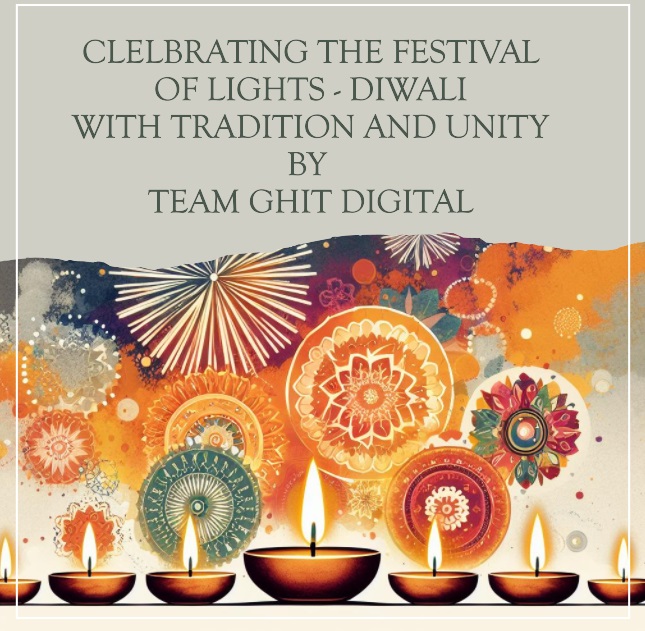
Happy Diwali America: Illuminating the Festival of Lights with Tradition and Unity
Diwali Celebrations by Team GHIT Digital
Diwali, the Festival of Lights, is one of the most important Hindu festivals celebrated by Hindus worldwide. It is a celebration that transcends borders, uniting millions of people around the world in the warm glow of tradition and spirituality. Rooted in the ancient Sanatan Hindu perspective, Diwali holds profound religious and historical significance, making it one of the most cherished festivals in Hinduism. Diwali, the festival of lights, is a five-day festival that usually falls in the months of October or November. Diwali symbolizes the triumph of light over darkness, good over evil, and knowledge over ignorance.
Indian Americans: Sustaining Tradition in the Land of Religions
For the Indian American community, Diwali is a time to connect with roots while embracing the culture of their adopted homeland. From private celebrations in homes to public events in cities across the nation, Indian Americans contribute to the rich tapestry of Diwali celebrations in the United States. Diwali has become increasingly popular in the United States, where there is a large and growing Indian American community. Diwali celebrations in the US often feature traditional Indian food, music, and dance performances. In 2002, Diwali was celebrated for the first time at the White House. Since then, several US Presidents have hosted Diwali celebrations or issued Diwali proclamations, including President Bill Clinton, President George W. Bush, President Barack Obama, President Donald Trump, and President Joe Biden.
Religious and Historical Significance: A Glimpse into Sanatan Hinduism
According to Sanatan Hindu traditions, Diwali is associated with the return of Lord Rama from his 14-year exile and his victory over the demon king Ravana. According to Sanatan Hindu beliefs, Diwali marks the return of Lord Rama to Ayodhya after defeating the demon king Ravana. The lighting of lamps and the bursting of firecrackers symbolize the triumph of righteousness and the dispelling of ignorance. The festival is also connected to the legend of Lakshmi, the goddess of wealth and prosperity.
Global Observance: A Worldwide Festival
Diwali is celebrated with great enthusiasm and fervor by Hindus across the globe. From India to the United States, Nepal to Trinidad and Tobago, Sri Lanka, Mauritius, Guyana, Fiji, and Suriname. The celebrations vary from country to country, but they all share the common themes of light, joy, and hope. The festival unites families and communities in joyous festivities. The diverse ways in which Diwali is observed reflect the cultural richness of the Hindu diaspora.
Diwali Celebrations Worldwide: A Tapestry of Traditions
The celebrations often begin with cleaning and decorating homes, symbolizing the welcoming of prosperity and good fortune. Families come together for special prayers, feasts, and the exchange of gifts. The lighting of Diyas (oil lamps) and the display of vibrant rangoli (colorful floor designs) add to the festive ambiance.
Diwali in the United States: Bridging Cultures and Communities
In the United States, Diwali has become a cherished cultural event embraced by a diverse array of communities. The White House itself has witnessed the glow of Diwali lamps during various presidencies. Over the years, American Presidents have acknowledged and celebrated Diwali, underscoring the significance of diversity and religious pluralism.
Presidential Recognition: Diwali in the White House
Presidents have often extended warm wishes to those celebrating Diwali, recognizing the festival's importance in the lives of millions. The lighting of the ceremonial Diya in the White House has become a symbolic gesture, emphasizing the values of unity and religious freedom.
Beyond Politics: Diwali in American Society
Beyond the political realm, Diwali is embraced by American society at large. Corporations, educational institutions, and individuals participate in the festivities, promoting cultural exchange and understanding. Diwali melas (fairs), cultural programs, and community events showcase the vibrancy of Hindu traditions and foster a sense of belonging. Diwali is also celebrated by many American politicians, corporate leaders, and ordinary Indian Americans. Some of the ways that Diwali is celebrated in the US include:
Conclusion: A Festival that Transcends Boundaries
As the Festival of Lights transcends borders and cultures, Diwali serves as a reminder of the shared values of light, love, and the triumph of good over evil. Top of Form
Diwali is a time for Hindus to celebrate their faith, their culture, and their community. It is also a time for all people to appreciate the beauty of light and the importance of hope. As the Indian American community continues to grow and thrive in the United States, Diwali is sure to become an even more important and widely celebrated holiday. As the lamps are lit, and the festive spirit takes hold, Happy Diwali America!